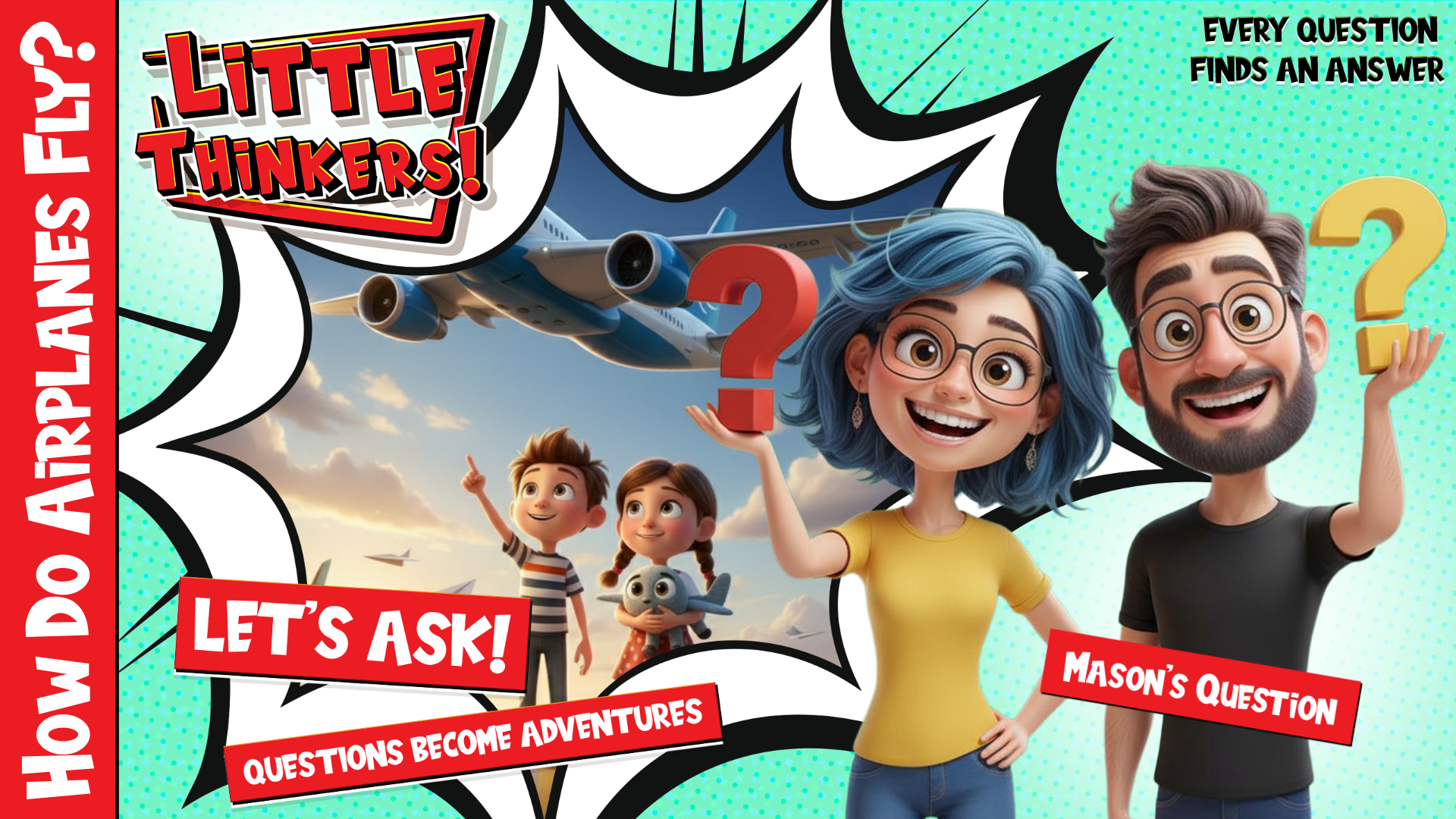How Do Giant Metal Birds Stay in the Sky?
Have You Ever Wondered About Flying Machines?
Imagine you’re standing in your backyard, throwing your favorite toy airplane. You watch it soar for a few seconds, then… whoosh! Down it comes, tumbling to the grass. But wait! Look up at the sky. There’s a huge, heavy airplane with hundreds of people inside, floating through the clouds like a giant metal bird! How is that even possible?
This is one of the most amazing mysteries in our world. How do these enormous flying machines stay up there while your toy plane always falls down? Get ready for an incredible journey into the science of flight that will make you look at airplanes in a completely new way!
The Invisible Enemy Called Gravity
First, let’s talk about why your toy plane falls down. There’s an invisible force called gravity (that means the power that pulls everything toward the ground). Gravity is like having an invisible giant gently pushing down on everything all the time!
When you drop your backpack, gravity pulls it down. When you jump on your bed, gravity brings you back down. And yes, when you throw your toy airplane, gravity is working hard to pull that little plane right back to Earth!
Gravity Never Takes a Break!
Here’s something mind-blowing: gravity is pulling on real airplanes too! Even those massive jets that weigh as much as 80 elephants are constantly being tugged downward by gravity’s invisible hands. So how do they stay up? They need something super powerful to fight back!
The Secret Weapon: Invisible Air
Take a deep breath right now. Feel that? You just breathed in the secret ingredient that keeps airplanes flying – air! Even though you can’t see air, it’s everywhere around us, like an invisible ocean.
Air might seem like nothing, but it’s actually incredibly powerful! Try this amazing experiment: next time you’re in a car, stick your hand out the window (with a grown-up’s permission, of course!). Feel how the air pushes against your hand? That’s air showing off its strength!
Your Hand Can Be a Wing!
Now here’s the really cool part – tilt your hand like you’re making an airplane wing. Notice how the air tries to lift your hand up? Wow! Your hand just became a tiny airplane wing! You’re feeling the same force that keeps real airplanes in the sky!
The Amazing Shape That Makes Magic Happen
Airplane wings aren’t just flat pieces of metal – they have a very special, magical shape! If you look at a wing from the side, it’s curved on top and flatter on the bottom, kind of like a teardrop lying on its side.
This special shape is called an airfoil (that’s just a fancy word for “air-cutter”), and it’s the key to the whole flying mystery! When air flows over this curved wing, something absolutely amazing happens!
The Air Split Adventure
Picture this: when an airplane zooms forward, the air hits the front of the wing and splits into two streams. One stream goes over the curved top, and the other stream goes under the flatter bottom. It’s like water splitting around a rock in a river!
But here’s where it gets super interesting – the air going over the curved top has to travel a longer distance, so it has to move faster! It’s like two friends racing around a playground – one takes the long way around the jungle gym (curved top) while the other takes the short, straight path (flat bottom).
The Incredible Air Pressure Trick
Now comes the brain-tickling part that even amazes grown-up scientists! When air moves faster (like the air on top of the wing), it actually pushes less hard. When air moves slower (like the air under the wing), it pushes harder!
So the slower air underneath the wing is pushing up really hard, saying “Up you go!” while the faster air on top is too busy rushing around to push down very hard. The result? The wing gets pushed up!
It’s Like a Magical Air Elevator!
This upward push is called lift – it’s nature’s own elevator system! The air under the wing is like having thousands of invisible hands gently lifting the airplane up, up, up into the sky!
Speed: The Super Important Secret Ingredient
But wait, there’s more to this flying puzzle! Even with perfect wing shapes, airplanes need one more crucial thing: speed! They need to go really, really, REALLY fast!
Your toy airplane moves fast when you first throw it, but then it slows down because it doesn’t have engines. Real airplanes have powerful engines that keep them zooming through the air at over 300 miles per hour – that’s faster than the fastest race car!
Why Speed Matters So Much
Think of it like riding your bicycle. When you pedal slowly, it’s hard to balance and you might wobble. But when you pedal fast, you zoom along smoothly! Airplanes need that speed to make enough air flow over their wings to create the lifting power they need.
Learning from Nature’s Flying Experts
Here’s something absolutely incredible – birds figured out all these flying secrets millions of years before humans did! Birds are like flying professors who taught us everything we know about staying in the air.
Birds have the perfect wing shape naturally, and they flap their wings to create their own speed. It’s like having built-in engines and perfect airplane wings all in one amazing package!
The Wright Brothers Were Bird Watchers
The Wright brothers, who built the very first airplane in 1903, spent years watching birds carefully. They noticed that birds don’t just flap up and down – they twist and angle their wings to catch the air just right. Smart feathered engineers!
Mind-Blowing Flying Facts
Ready for some facts that will make your brain do loop-de-loops? A jumbo jet weighs as much as about 80 elephants, but those amazing wings can still lift all that weight plus passengers, luggage, and fuel!
Every time you see an airplane in the sky, you’re watching one of the most incredible examples of humans working together with nature. We took the invisible power of air, learned the secrets from birds, and added our own engineering magic!
The Four Forces of Flight
Scientists have discovered that every flying thing – from tiny hummingbirds to massive airplanes – must balance four important forces:
- Lift pushes up (created by those special wing shapes)
- Gravity pulls down (the invisible force we talked about)
- Thrust pushes forward (from engines or flapping)
- Drag pulls backward (air resistance trying to slow things down)
Your Turn to Be a Flight Explorer!
Now that you know the secrets of flight, you can become your own airplane scientist! Try making paper airplanes with different wing shapes and see which ones glide the longest. You’re doing the same experiments as real airplane engineers!
Watch birds outside and notice how they use their wings differently for taking off, flying straight, and landing. You might even see how they spread their tail feathers like tiny steering wheels!
Fun Flying Experiments You Can Try
Here are some amazing things you can do to explore flight:
- Make paper airplanes and test different wing shapes
- Watch how dandelion seeds float on the air
- Observe how birds change their wing positions
- Feel the air pressure when you wave a piece of cardboard
What Amazing Questions Will You Ask Next?
So the next time you throw your toy plane and watch it fall, remember – it’s doing exactly what a real airplane does! The only difference is that real airplanes have powerful engines to keep them speeding through our invisible air ocean.
Your curiosity about why planes fly has led us on an incredible journey through the science of lift, air pressure, wing design, and the amazing partnership between humans and nature. Every airplane in the sky is proof that when we ask great questions and observe the world around us, we can solve the most incredible puzzles!
What other flying mysteries make you wonder? Why do some birds soar without flapping? How do helicopters stay up with spinning wings? How do rockets fly where there’s no air? Keep your curiosity soaring high – the sky is full of amazing questions waiting for curious minds like yours!













